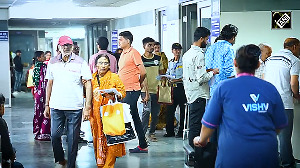Just 3.4 per cent of those looking for white-collar jobs through a popular website in the country belong to the Other Backward Castes; another 1 per cent belong to the Schedule Castes and Scheduled Tribes category. This gives some idea of how skewed the white-collar job market is, given that OBCs are said to comprise around 36 per cent of the population and those in the SC/ST group another 28 per cent. In other words, 64 per cent of the country find a 4.4 per cent representation among educated job-seekers.
The easiest way to explain this away is by dismissing it as a non-representative sample, for such it is in the broad national context. But that would be to miss the point. Admittedly, a database of 10 million résumés from educated people who have access to computers, in a total labour force of 470-odd million and a workforce of 458 million (the difference between the two is the number of unemployed people), is not the ideal database to use for assessing a national problem.
But if you keep in mind that just 7 per cent of those employed are what the National Sample Survey calls 'professional/technical/managerial' (a category that overlaps to some degree with the Naukri.com database), the sample cannot be dismissed quite so easily and becomes relevant in the context of the pressure being put on private sector employees to hire more people from the deprived caste groupings. Anecdotal evidence suggests that the caste balance is often quite representative in manufacturing companies with a large blue-collar workforce, but not so in companies that have mostly white-collar employees.
The conclusion that suggests itself, therefore, is that the problem is not with the companies that do the hiring but with the nature of the job market -- there probably aren't enough SC/STs and OBCs who have the requisite educational qualifications. It is possible that the 4.4 per cent number is not reliable because a large number of people registered on the Naukri website have not disclosed their caste affiliations. Nevertheless, it does suggest that if only a relatively small number out of those applying for white-collar jobs on the Naukri jobs site are OBCs and SC/STs, it is probably the case that a less than proportionate number of OBCs and SC/STs are college graduates or even matriculates. The root of the problem would then lie not in the job market but in the education system.
This ties in with what the National Sample Survey data indicate. A series of reports run by this newspaper last year showed that while OBCs comprised 32 per cent of the population (excluding the OBCs who were Muslims and classified separately as such), when it came to those enrolled in college, only 23 per cent were OBCs; in the case of SC/STs, while they were 28.3 per cent of the population, they comprised under 16 per cent of those enrolled in colleges.
Action must therefore begin in the education sector -- going down to the school level. In the case of non-Muslim OBCs, they're 32 per cent of the population, but only 26 per cent of the country's high-school passed population; it should not therefore surprise that only 23 per cent of those who are enrolled in college are from these deprived backgrounds. To get more people from the deprived castes into white-collar occupations, reform must start at the school level and go through to the higher stages of the education system. If there are enough qualified candidates in what is a heated job market, the OBCs and SC/STs will get hired.






